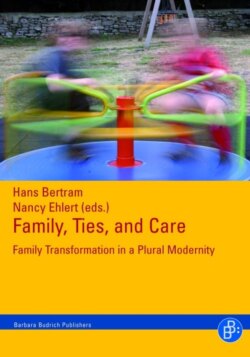Читать книгу Family, Ties and Care - Группа авторов - Страница 6
На сайте Литреса книга снята с продажи.
ОглавлениеEditors’ Foreword
The family is not only the place where groundwork is laid for the human resources of a society; it is also the foundation for a lifetime of generational solidarity and the willingness to take responsibility for the care of others. The present volume offers 35 contributions from noted scholars in sociology, political science, ethnology, economics, psychology, and anthropology, from many different regions of the world, on the subject of safeguarding the provision of care within the family, ensuring care, and supporting the older generation.
As part of this collection, we take up the perspective of William J. Goode (1963) in his book World Revolution and Family Patterns and present studies on developments in the family, family lifestyles, and children’s living conditions that can be recognized at the local level in regions such as Europe, the United States of America, Japan, China, Africa, and the Middle East. In contrast to Goode’s approach, however, the future developments in these countries are predicted on the basis of studies by authors who work and do research in the regions. The structure of the book thereby establishes two perspectives: we present the stages in the development of family lifestyles that vary from place to place and the ones that coincide, and at the same time we specify ideas for the future with reference to the respective cultural contexts. This method allows us to identify the cultural differences in the respective developments in addition to the commonalities, and to depict the plurality of modernity.
The first part of this volume explores the disappearance of the male breadwinner role in industrial society, prompting a discussion of fatherhood, marriage, and models of care. The next section, on challenges in the evolution of attachment and care, focuses on strategies that go beyond combining care, work, and gender roles to conceive of a social policy for the 21st century. Following this, we turn our attention to individual regions – Europe, Japan, China, Africa, and the Middle East – to make demographic, economic, family- and gender-specific assessments and to discuss the problems and solutions inherent in intergenerational relationships and the care of the elderly.
The editors give special thanks to the Ernst Freiberger Foundation, without whose financial support this book would not have been possible. Ernst Freiberger, the head of the foundation, deserves particular thanks for allocating the funds for such a comprehensive work. This book is based on his idea of world visions, which are already reflected in the volume previously initiated by the foundation, Religion – Humanity’s Blessing or Curse?1 This book would not have come about without Freiberger’s fundamental perspective that the future of the family decides the future of humanity, and his understanding of the foundation as a bridge between scholarship and society.
We owe our thanks also to the authors, who with their work have contributed to a vibrant spectrum of analysis and country-specific reports. We are grateful for their collaboration, which offers the reader a current, comprehensive view of regions across the globe, one that reflects many years of research by the scholars involved and thus guarantees a diverse array of scientific insights. Barbara Budrich, the publisher, provided knowledgeable and competent support and has our gratitude for her patience throughout the process of completion of this collection. Her precise and personal counsel and encouragement were decisive factors in the success of this book. We also thank Casey Butterfield, who translated the German contributions into English with great care, as well as Antje Korsmeier and Marie Naumann, who carried out the translations from English into German with precision. We thank native speaker Máiréad Collins for her professional editing of the English translations. We also thank Katrin Konrath and Mira Pielen for their helpful editorial support. Finally, the editorial work on this volume was made possible through cooperation and mutual trust, and the editors are grateful to each other: Hans Bertram directed the project with great inspiration and a wealth of ideas, and Nancy Ehlert acted as liaison with the contributors and oversaw the editorial preparation of the manuscript.
1von Brück, Michael (ed.) (2008): Religion – Segen oder Fluch der Menschheit? Frankfurt: Verlag der Weltreligionen.
